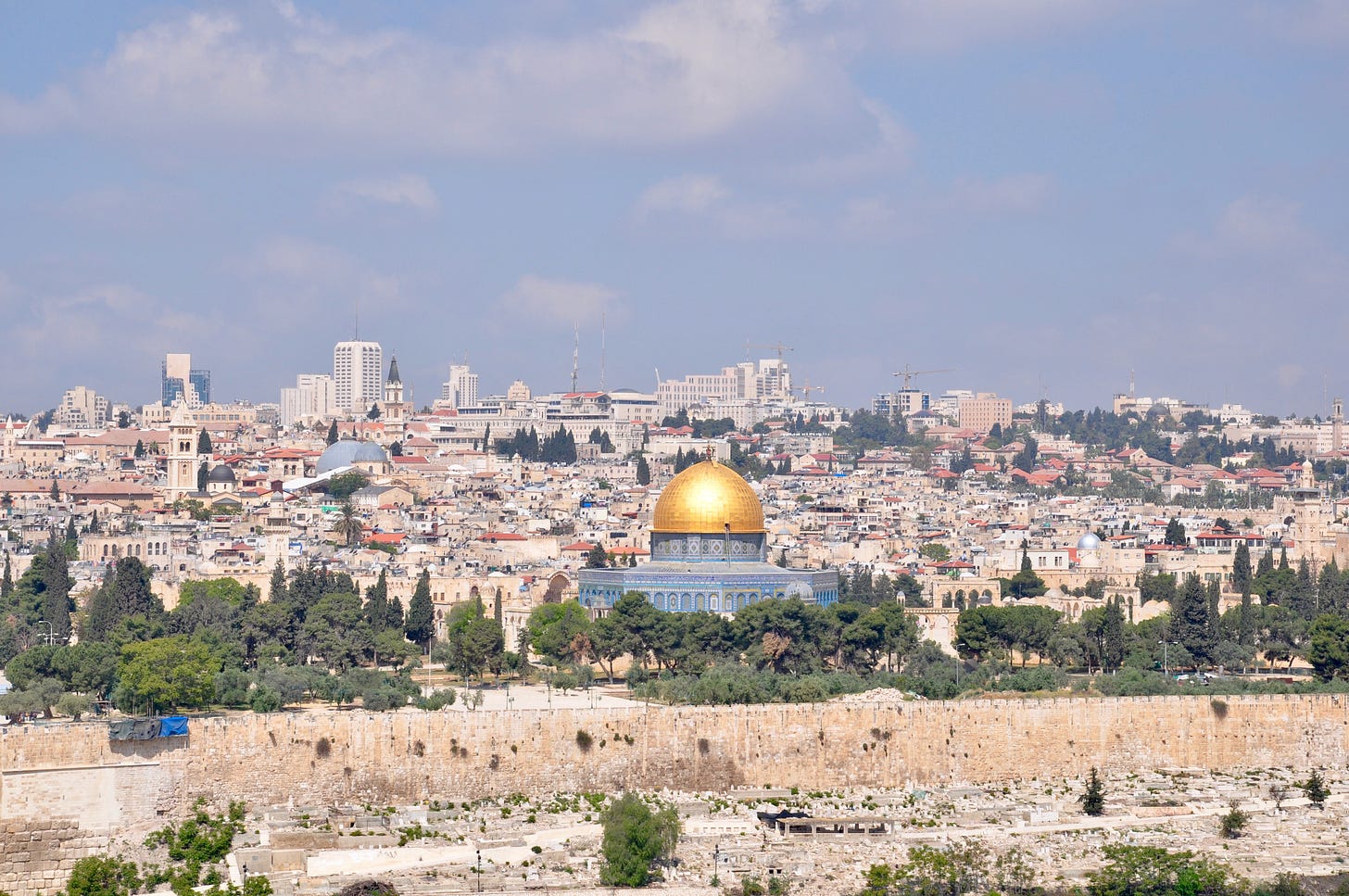The Temple Mount
Today is the last Friday of Ramadan. While events over the past few weeks have been volatile, the situation has remained much better than last year, which led to a war with Gaza and rioting in several mixed Arab-Israeli towns. Palestinians have used the Temple Mount as a trigger to incite their people and supporters throughout the world since the 1920s (when the Hebron and other riots began over the placement of a Mechitza separating men and women — that action was used to claim the Jews wanted to take over the Mosques on the Temple Mount).
Hamas encouraged its supporter to violently demonstrate in the Mosques. Entering the mosque to quell the violence, Israeli police fell into the Palestinian trap, to a certain extent, by providing photos used to claim the Israelis had violated the sanctity of the Mosques. Sometimes it pays to be smart and not right — and this was one of those times. However, despite the provocations, and the early wave of terror that started this year’s Ramadan holiday, the government's work in advance of the month-long holy period seems to have paid off. On Wednesday evening, an estimated 200,000 Muslims peacefully prayed on the Temple Mount.
The political impact of this season's events has been limited. The Arab Ra’am party protested the entry of the police into the Mosques by stating they would boycott the coalition until after the spring break; a step that has absolutely no political effect.
DEFENSE
On Wednesday night, Israel reportedly attacked Syria. During the past ten days, there has been a rocket attack along the Gaza Border, as well as, an attack up north near the town of Shlomi. Neither rockets caused injuries or damage.
HOLOCAUST REMEMBRANCE DAY
Yesterday, Israel commemorated Yom HaShoah, which came this year, in the middle of Putin's war of aggression against Ukraine. While we profoundly hope there will never be another Holocaust, Putin’s war and Russia's actions in it remind us that true evil still exists in the world, and that cruelty with homicidal tendencies is not limited to the SS.
This year's speeches at Yad Vashem were different in tone and nature than those of the past years, especially that of Prime Minister Bennett. He gave an excellent low-key speech about what differentiated the Holocaust from all other terrible events. Bennett spoke about our need to remain strong and to have the best-armed forces in the world. Prime Minister Bennett concluded with a plea to limit the partisan enmity between right and left-wing, reminding the audience that during the Holocaust, the Jewish resistance was often broken up into right-wing groups and the left-wing Jewish groups; i.e., that even in the face of the worst possible enemy the ideological opponents were unable to work together. Bennett declared that enmity has to end. It should be noted that both Bennett and his son have received death threats in recent days.
IRAN
The one thing that seemed missing from Bennett’s speech was a reference to Iran. Over the past decade, I do not think former Prime Minister Netanyahu gave a single speech at Yad Vashem that did not reference Iran. Unfortunately, it looks like there will be no return to the JCOPA. America and Iran do not look like they will reach an agreement. So, now what? Withdrawing from the JCPOA without a clear alternative will go down in history as one of the largest blunders made by Netanyahu/Trump. As a result of Netanyahu and Trump’s efforts, Iran is now very close to having the wherewithal to build an Atomic bomb.
RECALL
The largest recall in Israel’s history took place this week, when Salmonella was discovered in one of Strauss’ dairy factories, which produce chocolates and candies. The plant was closed and the products made there were recalled. Strauss’ direct loss as a result of this outbreak is expected to be more than NIS 100 million.
Economy
Over the last two months, the Israeli Shekel has changed direction and has devalued by 7% over that period. The Shekel, which had been close to 3 Shekels per dollar, is now at 3.2. This is good news for Israeli start-ups who raise funds in dollars, as well as, all exporters. However, the devaluation is contributing to rising inflation in the country.
The Israeli startup Wi-Charge has signed an agreement with leading accessory manufacturer, Belkin, to incorporate WiCharge's technology to enable Belkin to begin selling a true wireless charger by next fall.
Ziv, a leader in high-resolution inspection and repair of microLED, QLED, and OLED displays, announced it has raised $10 million in a Series A1-round, led by BlueRed Partners, a Singapore-based venture capital fund. Co-investors include OurCrowd, a number of Asian family offices, and existing investors. Ziv will use the capital to accelerate its product development of fast electroluminescence (EL) and photoluminescence (PL) automated solutions, make strategic company appointments, and expand its global presence with a particular focus on the US and Asia to support growing customer demand.
Ziv's unique approach harnesses advanced nano-optical technology to empower display manufacturers to effectively inspect advanced displays with the highest optical and spectral resolution. Their solution enhances the manufacturing process, boosts yields, and enables greater consumer access to the latest microLED and QLED products such as near-eye AR smart glasses, wearable devices, and foldable screens.
Amazon has invested in BioniHive, a Sderot-based developer of an industrial robot called SqUID which can sort select and distribute packages in a warehouse. The firm, which mostly bootstrapped its development, has received funding in the past from OUR Crowd. The size of Amazon's investment was not disclosed.






